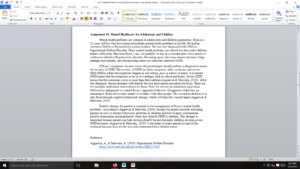Mental Healthcare for Adolescence and children
Scenario
Ryan is a 12 year old diagnosed with Oppositional Defiant Disorder (ODD). As a small child, Ryan was first diagnosed with Attention Deficit, Hyperactivity Disorder. He had just started preschool and was unable to remain in one place for more than a minute or two. His parents had already had a very difficult time in disciplining him, because he would become very upset and throw temper tantrums when he could not do as he wished. He just seemed to be an unhappy, irritable child. This behavior continued in school. As time progressed, Ryan was diagnosed with Oppositional Defiant Disorder, because he continued to refuse to listen to adults and comply with the rules.
By the age of 12, he has begun to bully and annoy others. His parents have decided that the approaches they have used in the past are not working, and they are more afraid his behavior will only get worse.
Initial Post
Provide explanations for these questions and statements:
- Describe the behaviors apparent for each disorder in this scenario (Attention Deficit Hyperactivity Disorder and Oppositional Defiant Disorder).
- If this behavior becomes worse and Ryan starts to violate the rights of others, what medical diagnosis will be given and why?
- Discuss at least two types of medication appropriate to treat Ryan and support your choices with rationale and credible resources
- Describe why therapy for the parent is important in this scenario including at least two supporting rationales.
Assignment 02
Endocrine Disorder Guides
Competency
Evaluate responses to nursing interventions for clients with endocrine disorders.
Scenario
You are working as a nurse supervisor. You are finding a lot of new nurses are unfamiliar with certain endocrine disorders. You have decided to put together a guide for these nurses to educate them on different endocrine diseases and provide them with ways to provide quality multidimensional care.
Instructions
Compare and contrast two endocrine disorders within the guide. Include the following information:
- Identify and compare the causes and diagnostic tests.
- Identify and compare the signs and symptoms of the disorder.
- Describe the nurses’ role in caring for a patient that suffers from this disorder to include the multidimensional aspects of nursing care.
- Identify how you will evaluate responses to the interventions taken for each disorder.
Resources
Submit your completed assignment by following the directions linked below. Please check the Course Calendar for specific due dates.
My questions is for Mental Health and Multidimensional care.
My questions are explained in the folder below. One is discussion and the other essay.
Requirements: Essay | 1 pages, Single spaced
Assignment 01 is a discussion post that is due this Tuesday. Can you please get it done by that day? Below is the rubric for assignment 02.
| Emerging | Competence | Proficiency | Mastery | |
|---|---|---|---|---|
| Causes and Diagnostic Tests (5 Pts) | Vaguely identified and compared the causes of the disorders and the diagnostic tests used to identify them. | Identified and compared some of the causes of the chosen disorders and the diagnostic tests used to identify them. | Concisely and accurately identified and compared the causes of the disorder and the diagnostic tests used to identify them. | Skillfully identified and compared the causes of disorders and the diagnostic test used to identify them. |
| Signs and Symptoms (5 Pts) | Vaguely identified signs and symptoms of the disorders. | Reasonably identified the signs and symptoms of the disorders. | Accurately identified the signs and symptoms of the disorders. | Provided a comprehensive list of signs and symptoms of each disorder to include assessment findings. |
| Nurse’s Role in Providing Multidimensional Care (15 Pts) | Attempted to describe the nurse’s role in providing multidimensional care for the chosen disorders. | Occasionally identified the nurse’s role in providing multidimensional care for the chosen disorders. | Concisely identified the nurse’s role in providing multidimensional care for the chosen disorders. | Completely identified the nurse’s role in providing multidimensional care for the chosen disorders and provided appropriate interventions. |
| Response to the Interventions (10 Pts) | Attempted to evaluate the responses to interventions for the chosen disorders. | Created a moderate list of responses to interventions for the chosen disorders. | Created a satisfactory list of responses to interventions for the chosen disorders. | Created a detailed list of responses to interventions for the chosen disorders and included an evaluation of the interventions for the disorders. |
| Spelling and Grammar (5 Pts) | Numerous spelling and grammar errors that detract from the audience’s ability to comprehend material.
|
|
Few spelling and grammar errors that do not detract from the audience’s ability |


